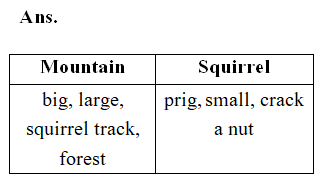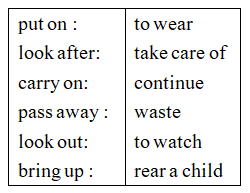Bihar Board Class 8 English Part III Chapter 7. The Mountain and the Squirrel Text Book Questions and Answers
7. The Mountain and the Squirrel
TEXTBOOK QUESTIONS AND THEIR ANSWERS
B. LET’S COMPREHEND :
B.1.1. THINK AND TELL:
Q. 1. What is the poem about?
Ans. The poem The Mountain and the Squirrel is about mountain and squirrel.
Q. 2. Who started the quarrel?
Ans. The mountain started the squirrel.
Q. 3. Do the mountain and squirrel have the same talent ? Give reasons for your answer.
Ans. No, the mountain and the squirrel have not the same talent. The Mountain is large and still but the squirrel is short and spry. So, they are not equally talented.
Q. 4. How did the squirrel defend herself?
Ans. The squirrel says that though the mountain is large and she is small, still both have some talents. So, it cannot be said that the one is excellent than the other.
B.1.2. Say whether the following statements are “True or False’.
1. The squirrel was very wise.
2. The mountain was proud of its size.
3. The squirrel argued that every one has his/her own qualities.
4. The squirrel cannot break a nut.
5. Bigger creatures have no right to be proud of their size.
Ans. 1. True, 2. True, 3. True, 4. False, 5. True.
B.2. THINK AND WRITE:
B.2.1. Tick the most appropriate answer to each of the questions given below.
Q. Who is referred to as “Bun” ?
(a) forest
(b) mountain
(c) squirrel
(d) weather
Q. “All is well and wisely put” means:
(a) the squirrel is the most wise creature
(b) all animals are wise.
(c) nature has given particular talent to particular things
(d) wise persons keep silent
Ans. 1. (c), 2. (c).
B.2.2. Answer each of the following questions in not more than 50 words.
Q. 1. Why do you think the mountain calls the squirrel “Little prig”?
Ans. The squirrel is a small animal. It has no capacity to do any heavy work. It is very weak and feeble. So, the mountain calls it little prig.
Q. 2. What qualities of the mountain does the squirrel appreciate? List them.
Ans. The squirrel appreciates the mountain for its largeness, squirrel track and forest.
Q. 3. What task is the mountain unable to perform?
Ans. The mountain is unable to crack a nut.
Q. 4. Do you appreciate the logic of squirrel ? Give reasons.
Ans. Yes, the logic of squirrel is appreciable. Because, it very cleverly defies the mountain’s good qualities and praises self-importance.
Q. 5. Was the reaction of the squirrel justified? Give reason.
Ans. Yes, the reaction of the squirrel is justified. Every creature, great or small, is the creation of God. Everyone has its importance and good and bad qualities. So, everyone can react for self-respect.
C. WORD STUDY:
C.1.Find out from the text the words that refer to the mountain and the squirrel and put them in the appropriate box below. One has been done as an example.


C.2. Phrasal Verbs
The expression ‘taken in’ in line 8 of the poem is a phrasal verb. When a verb is followed by a preposition or an adverbial particle, it is called a phrasal verb. The meaning of a phrasal verb is different from the meaning of its parts. For example in ‘taken in’ ‘take’ and ‘in’ have independent meanings but when ‘in’ is added to ‘take’ it becomes a phrasal verb and it means ‘consider’ or ‘included’ which is different from the meaning of its parts.
Here are a few more phrasal verbs that have the verb ‘take’ in them : Take after, take away, take back, take down, take off, take on, take out, take over, take up.
Q. Look up a dictionary and find out what each one of these means and try to use them in sentences.
Ans. Take after (resemble)—The son takes after his father.
Take away (remove) — Take away five from seven.
Take back (withdraw) —The man took back his promise.
Take down (note) —Take down what I dictate.
Take off (remove) —Take off your dirty shirt.
Take on (agree to do it) —Take on your work.
Take out (remove) —Take your money out from my pocket.
Take over (assume control) —The manager took over his charge.
Take up (occupy) —The passenger took up his scat.
Q. Pick out other phrasal verbs from the poem.
Ans. take in, make up, carry on.
Q. Fill in the passage given below with the phrasal verbs given in the box:

Parents … look after … their children with proper care. They make them learn how to … dresses. They ……. their kids with affection. They ……. their education in best possible school. The time ……. fast. The parents become older. Then the children …… their old parents.
Ans. put on, bring up, carry on, passes away, look out.
D. LET’S TALK:
Q. Work in groups and discuss ‘for’ and ‘against’ any one of the following statements in your group :
(a) No finger in a hand is better than the other.
(b) Small things are less costly than big ones.
(c) A needle is not as useful as a sword.
Ans. (a) No finger in a hand is better than the other.
Chintoo : Do you feel the importance of your fingers equally?
Pintoo : No, I feel the thumb more important.
Ketu : I feel all the fingers equally important, because a single finger cannot do all work.
Chintoo : I think that every finger has its purpose, so all the fingers are differently shaped.
(b) Small things are less costly than big ones.
Kapil : I see, Golu, that small things are less costly than big ones.
Golu : But, your thinking has no base, as a nose-pin of gold costs more than a big iron nail.
Ritesh : Yes, it is not the size of a thing that costs higher or lower, but its element and importance fix the cost.
(c) A needle is not as useful as a sword.
Rakhi : A needle is not as useful as a sword.
Ruchi : It is not right to say that a needle is not as useful as a sword.
Soni : Yes, the needle and the sword both have their own importance. We cannot take work of a needle with a sword. Similarly, a needle cannot work in place of a sword.
Sabana : All right. We cannot neglect or accept a thing according to its size. Everything is important at its place.
E. COMPOSITION:
Q. Write a paragraph in about 50 words on :
“Everyone has his/her strengths and weaknesses.”
Ans. Everyone has his/her strengths and weaknesses.
Nature has created everything purposeful, and also with its good and bad features. The reason for this is that nature runs under dual force. Which we consider bad features, prove some way or other good features. Such is the case with the strengths and weaknesses also. Strength and weakness of anything make its components.
F. TRANSLATION :
Q. मैं अपने माता-पिता के साथ कल चिड़ियाघर (Zoo ) गया । वहाँ हमने अनेक जानवर देखे, जैसे : शेर, सफेद बाघ, हाथी इत्यादि । वहाँ मैंने खिलौना रेलगाड़ी (Toy Train) की सवारी की । वहाँ अनेक प्रकार के झूले तथा मनोरंजन के अन्य साधन भी उपलब्ध थे। हमने वहाँ भरपूर आनंद उठाया ।
Ans. I went to the zoo with my parents yesterday. There we saw several animals as : lion, white tiger, elephant, etc. There I travelled in the toy train. Different types of swings and other means of recreation were available there. We took sufficient enjoyment there.
SOME OTHER IMPORTANT QUESTIONS WITH ANSWERS
Q. 1. Why do the mountain quarrels with the squirrel?
Ans. The mountain is big. He has arrogance. So, he quarrels with the squirrel.
Q. 2. Is the mountain right to quarrel with the squirrel? Give reason.
Ans. No. the mountain is not right to quarrel with the squirrel, as everyone has some good and some bad qualities.
Q. 3. Who wins the quarrel?
Ans. It is squirrel who wins the quarrel.
Read more – Click here
YouTube Video – Click here
Leave a Reply